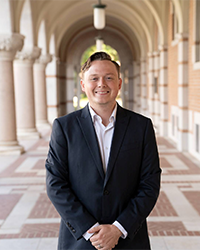< Return to program overview
Panel 5
|
The Politics and Agency of Cybercriminals

Conner Joyce
I am a PhD candidate in Political Science at Rice University with a focus in International Relations. My research investigates the impact of digital technology on international security. I study how technology can facilitate the emergence of security threats from non-state actors and how state actors can cooperate to mitigate these threats. I leverage original data collection, large-n observational analysis, large language models, and machine learning (deep transfer learning) to conduct this research. I hold a Master's degree in Public Affairs from the University of Texas LBJ School of Public Affairs and a BA in Political Science from Southwestern University.
Abstract
Keynote
Politics in the Dark Web: Mobilization and Radicalization in Cybercrime Networks
As cyberspace becomes increasingly entangled in geopolitical crises, illicit digital networks are becoming unexpected sites of political mobilization. Hacktivist organizations—emerging from cybercriminal communities—are increasingly intervening in international affairs and pursuing political agendas. Beyond adopting political agendas, these online groups have also embraced extremist causes. Terrorism analysts have called attention to many hackers that have declared their allegiance to terrorist organizations. What explains political mobilization and radicalization in cybercriminal networks? This paper investigates how such networks become politically activated and how they contribute to geopolitical disruption. To explain this phenomenon, I argue that hacking networks can become politically activated through individual interaction within the context of networks. I develop a theory of political mobilization in illicit digital networks, which explains how strong ties can form in the context of online and anonymized settings. To test this argument, I build a novel dataset of website defacements conducted by hacking groups by scraping over 350,000 self-reported defacements in the dark web. I use a combination of natural language processing, deep transfer machine learning, and network analysis to uncover how political messages and extremist rhetoric propagate within hacker communities. I find that illicit digital networks foster political mobilization and radicalization. The finding reveals how political narratives spread through cybercriminal infrastructures. The study addresses an important prerequisite to international cooperative efforts to regulate cyberspace. As illicit digital networks evolve into politically engaged communities, they blur the boundaries between criminality, activism, and political warfare. Hackers can act as proxies for state actors, pursue independent agendas, or shift fluidly between these roles over time. As a result, they complicate efforts to establish enforceable rules in cyberspace. By understanding how such actors become engaged with broader ideological and geopolitical topics, we can begin to imagine new models of cyber governance that are adaptive to the realities of non-state actors in cyberspace.